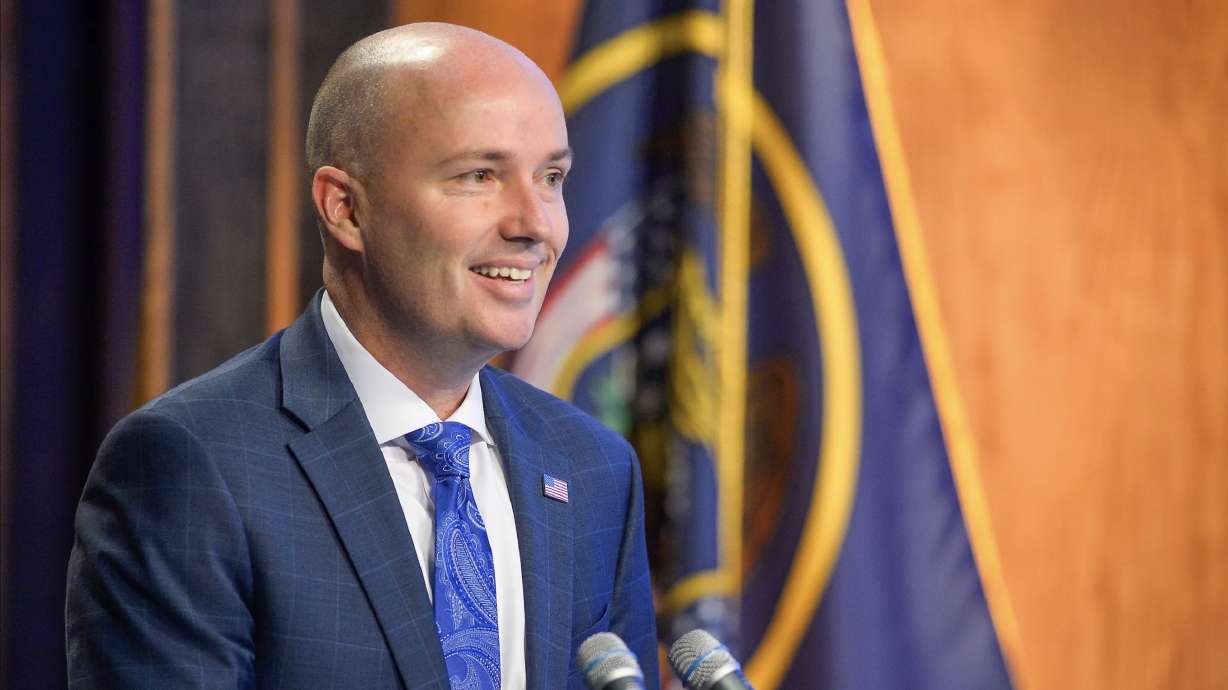Estimated read time: 4-5 minutes
This archived news story is available only for your personal, non-commercial use. Information in the story may be outdated or superseded by additional information. Reading or replaying the story in its archived form does not constitute a republication of the story.
SALT LAKE CITY — Utah Gov. Spencer Cox is shutting the door on medical "magic mushrooms."
The Republican governor told reporters during his monthly PBS Utah news conference Thursday that he's not supportive of a bill, SB200, being considered by the Utah Legislature to narrowly legalize psilocybin in a similar way the state currently regulates medical cannabis.
"I'm just not there yet," Cox said.
Senate Minority Leader Luz Escamilla, D-Salt Lake City, is sponsoring SB200, a bill that would allow Utahns over the age of 21 to receive a psilocybin treatment directly from a psilocybin therapy provider. Qualifying conditions would include depression, anxiety "if the patient has tried at least one other treatment which has not proven effective," PTSD and a condition for which individuals are receiving hospice care.
Escamilla plans to propose an amendment to narrow the bill to a pilot program capped at 5,000 participants in hopes it will help it gain traction in Utah's Republican-controlled Legislature.
'It's just not there yet'
However, Cox's firm no spells trouble for the bill. Even if it does gain approval from the Senate and House — which appears unlikely — it would probably be headed for a veto.
"I'd rather wait for the FDA," Cox told reporters when pressed to elaborate on his position. "It's just not there yet. We got there with medical marijuana. I just don't believe the science is there. I don't believe we should be experimenting on 5,000 people here in our state. And I think there are some serious consequences and side effects societally as well as medically that I'm not just comfortable with."
Psilocybin is currently classified as a federally prohibited drug in the U.S., and there's no telling if or when federal officials will revisit that classification.
'It's a big ask'
Escamilla, when asked about Cox's comments in a Senate leadership media availability later Thursday, said she had a conversation with the governor the day before so she was "not surprised" by his opposition to the bill.
"It's a big ask," she acknowledged, though she added she's "excited" it's still slated to be considered in a Senate committee to get the conversation started.
"I just want to make sure that we continue to address mental illness," she said, noting Utah has high rates of mental health illness. "To me, it's just one extra tool in the toolbox."
Escamilla and the bill's supporters, including the Libertas Institute, a Utah-based libertarian think tank, and the Utah Patients Coalition, argue there is promising research that supports positive effects of psilocybin, especially for patients with depression, anxiety and PTSD.
'Proven medication'
They also contend Utahns are already illegally obtaining "magic mushrooms," and Utah has an opportunity to provide legal guardrails to ensure patients could try psilocybin in a medicinal, controlled, safe environment.
"There are thousands of Utahns desperate for relief who are experimenting on the black market, risking losing their kids, their jobs and more by becoming felons simply because they need help," said Desiree Hennessy, executive director of the Utah Patients Coalition. "What we are proposing puts an end to experimental at-home treatment and puts proven medication in the hands of doctors."
Hennessy said Cox is a "governor, not a doctor," and argued research does support positive effects of psilocybin, pointing to studies at Johns Hopkins University.
"This is the thing. Everybody has to remember this grows in Utah in the wild," Hennessy said. "It's not like we can make this go away. The only thing we're stopping if we stop this (bill) is we're just stopping doctor education and doctors being involved. That's the only thing that stops if we end this conversation this year. That's it."
Connor Boyack, president of the Libertas Institute, said "this is a new conversation for many elected officials who are largely unfamiliar with the promising research on psilocybin and how it can profoundly help those with mental illness."
"We've not yet had an opportunity to bring the governor up to speed on the bill so we look forward to the opportunity to make our case as this issue moves forward," he said.
'Put a pause on it'
Even though SB200 is slated to receive a public hearing, Senate Republican leaders told reporters they're also hesitant to support it.
"I'm with the governor," said Senate President Stuart Adams, R-Layton.
Senate Majority Leader Evan Vickers, R-Cedar City, agreed, saying "at least for this year ... we probably ought to put a pause on it." However, he added it's "a space that we've kind of got to navigate through" in coming years, noting "magic mushroom" products have cropped up in some vape shops illegally and people are already obtaining them "on their own."
"There is potential for individual patients to really benefit, but it's kind of a unique medication that has to be administered in a very controlled environment and very controlled circumstances," Vickers, a pharmacist, said. However, "if it's used recreationally I would think there's potential real harm."









